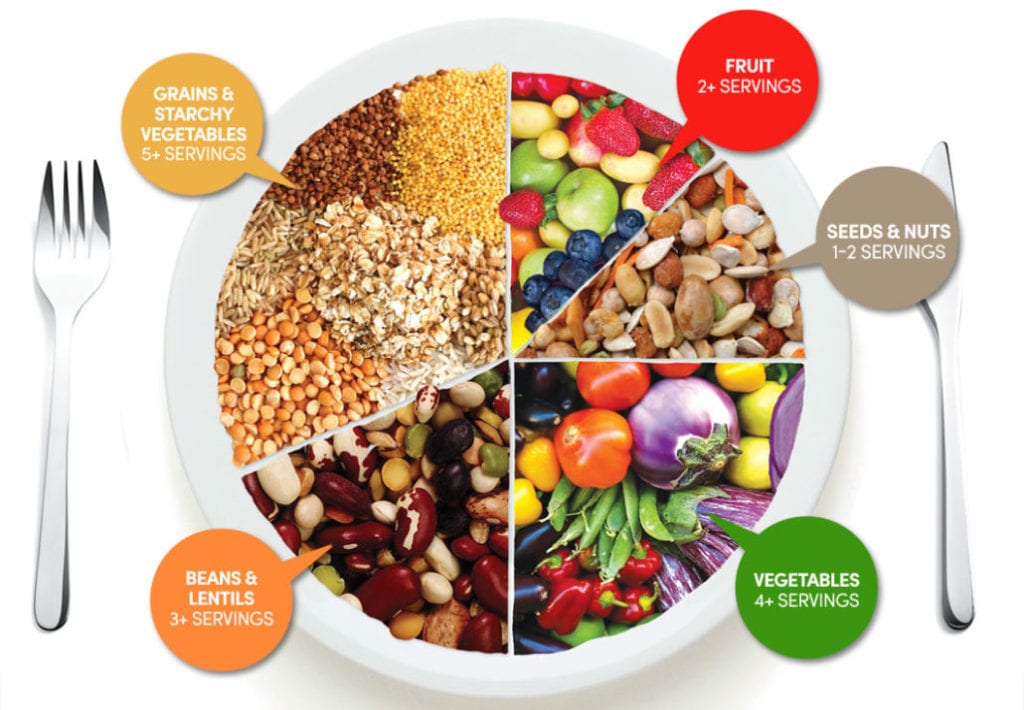Your Beginner’s Guide to a Whole Food Plant-Based Diet
Whole food, plant-based (WFPB) diets have become exceptionally popular in recent years. Indeed, television and streaming platforms are dotted with documentaries — Cowspiracy, What the Health, Forks Over Knives and The Game Changers, for instance — that educate and inspire viewers to consider transitioning to a whole food plant-based diet.
Maybe you’re someone who is ready to get started on your journey to eating plant-based diets. Or maybe you’re just curious about WFPB and want to explore the topic in a little more depth. Either way, that’s where we come in. So, sit back, grab some fruits and veggies, and discover the potential health benefits of adopting this lifestyle.
The Basics of a Whole Food, Plant-Based Diet
The goal of eating plant-based is to reduce the consumption of meat and processed foods as much as possible, or ideally, to eliminate them entirely. On the one hand, eliminating processed foods might not seem so bad. But to many omnivores, transitioning away from meat definitely might seem daunting. However, once you know what a plant-based diet can include, you can begin to develop a roadmap that can help you adopt this lifestyle.
What Does a Whole Food, Plant-Based Diet Include?
A whole food, plant-based diet includes eating primarily natural vegetables and fruits, seeds, nuts, and grains while eliminating animal-based foods (e.g., meat, eggs, and dairy). The diet is also free from processed and packaged foods.
For all those meat lovers that are considering making the switch to a plant-based diet, slow and steady will help win this dietary race. Making small changes — such as picking one day a week to go meatless and transitioning to nut-based milk instead of dairy milk — are all small steps that have been proven to make the transition easier. You’ll also likely begin to discover a multitude of meatless products (such as black bean burgers) that can help ease the transition and still provide valuable nutrition.
What Are the Health Benefits of a Whole Food, Plant-Based Diet?
You might be wondering, “But why is a plant-based diet supposedly so much better for me?” Actually, a quick google search can easily reveal thousands of potential advantages to eating a whole food, plant-based diet. By adopting this dietary change, you might:
- Improve your heart health and lower your risk of heart disease.
- Prevent and manage kidney disease.
- Protect against prostate cancer.
- Decrease your risk of colorectal and breast cancer.
- Alleviate rheumatoid arthritis symptoms.
- Prevent Type 2 diabetes.
- Reduce symptoms or induce remission of Crohn’s disease.
- Reduce chronic inflammation.
- Lower your blood pressure, blood lipids, and weight.
Plus, this diet might have benefits for children as well as adults. For example, eating plant-based may help reduce childhood obesity rates, which can help set the stage for lifelong help.
What The Science Says About Whole Foods, Plant-Based Diets

If you’re looking for what the research says about plant-based, whole foods lifestyles, you don’t have to look far. A meta-analysis of 40 studies expanding over a 40-year period examined over 12,000 vegans (those who eat a plant-based diet) and compared their diets to those of over 179,000 omnivores (those who eat both meat and plants in their diet).
Notably, the study indicated that a plant-based diet is linked to a more advantageous cardio-metabolic profile when compared with an omnivorous lifestyle. Compared to omnivores, vegans consumed fewer saturated fats. They also had lower body mass indexes (BMIs), cholesterol levels (low-density lipoprotein cholesterol, triglycerides), waist circumferences, fasting blood glucoses, and systolic and diastolic blood pressures.
There is also evidence to show that you won’t have to wait long before beginning to reap the benefits of this diet. For example, in a study of Type 2 diabetics who combined a plant-based diet with regular exercise, participants’ fasting blood glucose dropped an average of 35% within two weeks. In fact, five participants improved so much that they no longer required glucose-lowering medications.
Continued research is presented daily on the effects of a whole food plant-based diet. We encourage you to do your own research on this topic as we have only barely skimmed the surface. If this change is something that you are interested in, ask a healthcare provider if this diet is appropriate and safe for you!
What Are the Broader Benefits of Whole Food Plant-Based Eating?
Adopting a plant-based, whole foods diet may have broader lifestyle and community impacts beyond promoting better health. For example, eating plant-based may help improve kids’ academic performance. Moreover, there is considerable evidence that WFPB diets can have positive environmental impacts.
The Environmental Impact of Plant-Based Diets
There are various indicators that eating plant-based may be more sustainable and environmentally friendly. For example:
- The meat and dairy industry is a significant contributor to greenhouse gas emissions. However, studies show that the adoption of plant-based diets may help reduce diet-related greenhouse gas emissions by 49%.
- Pant-based diets can help save huge amounts of water. Some estimates state that approximately 460 gallons of water are required to produce just one quarter-pound hamburger.
- Marine life destruction may be reduced by eating plant-based. Fish farming and marine agriculture are significant contributors to ocean pollution and the destruction of ocean ecosystems. In fact, some scientists are estimating that the oceans could be uninhabitable for marine life by the year 2048.
- Our rainforests, which provide us with the oxygen we need to live, are being cut down to clear land for livestock (which support the meat industry). In turn, this leads to deforestation and catastrophic changes to the planet.
Don’t Wait to Prioritize Your Health!
Whether it’s adopting a whole foods, plant-based diet or taking care of a few outstanding medical issues, there’s no time like the present to start making positive lifestyle changes. Carolina Quick Care is ready to help support you in your journey with personalized health advice and outstanding, expert care. Simply walk in or book your same-day appointment now!
Ready to Start Your Healthy Eating Journey? Try This Delicious Plant-Based Burrito Bowl Recipe!
Looking for a quick and satisfying meal? This delicious Burrito Bowl recipe from Forks Over Knives is perfect for you! It’s a fantastic option for a healthy, plant-based dinner that everyone will love. Let’s dive in and see how to create this flavorful dish!
Prep time: 30 minutes
Serves: 2 – 4
Ingredients
- Baked tortilla chips
- 2-4 cups cooked grains (Quinoa, Brown rice, Bulgur, Lentils, Spelt, Barley)
- 2-4 cups cooked beans
- 2-4 cups chopped romaine lettuce or steamed kale
- 2-4 chopped tomatoes
- 1-2 chopped green onions
- 1-2 cups corn kernels
- 1 avocado, chopped
- Fresh salsa
- Optional: Fresh cilantro, lime juice
Instructions
- Break a handful of the chips into pieces at the bottom of each serving bowl.
- Spoon some of the cooked grains over the chips, followed by some of the beans, then layer on the rest of the toppings: lettuce or kale, tomatoes, onions, corn, and avocado. Top with the salsa. (Use more or less of all these ingredients, as desired.)
- Drizzle with lime juice and garnish with fresh cilantro for an extra burst of flavor. Enjoy your delicious plant-based burrito bowl!



Recent Comments